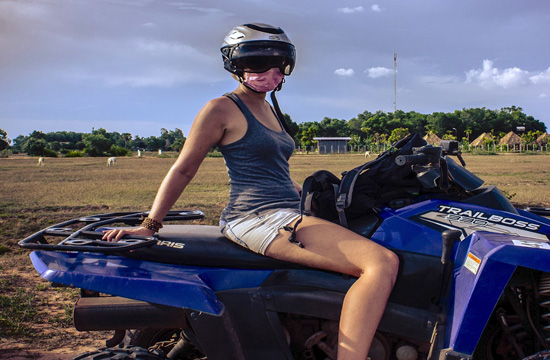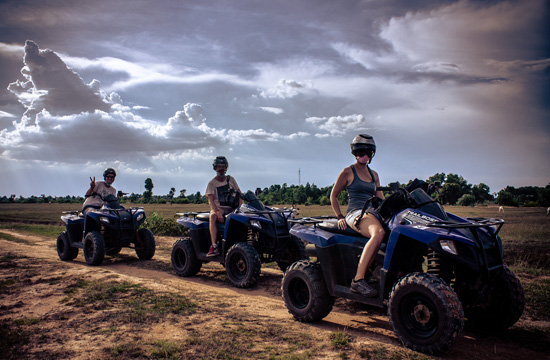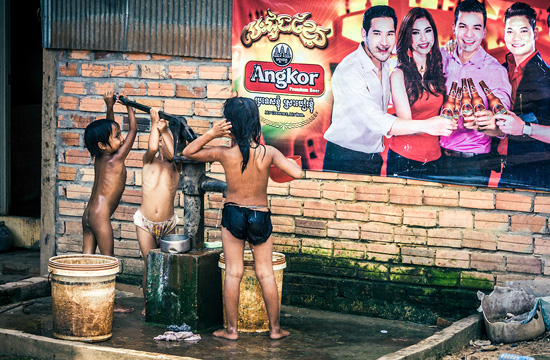“Rich White Chick”: Facing Scams and Poverty in Cambodia


We’re sitting next to the rented quad bikes on a dusty end-dry-season rice field, watching the sunset and listening to the stories of our tour guide. His stoical way of talking about giving up his innocent dreams makes my heart crumble. It’s not the first time I’ve heard a version of this story, but instead of getting dull it starts to sound more like a collective elegy for dead childhood dreams to me.
All of his three jobs together earn him $55 a month. I realize that the three of us each just spent more than his monthly earnings on this quad bike trip.
Our tour guide is 23 and came from the villages to Siem Reap, hoping for a better future. He works three jobs and attends evening school to learn English and rarely gets more than a few hours sleep at night. Instead he takes naps during the day whenever he can and it takes him a lot of effort to stay awake for the English classes.
All of his three jobs together earn him $55 a month. I realize that the three of us each just spent more than his monthly earnings on this quad bike trip. However like most companies here in Cambodia, the tour company probably isn’t Cambodian-owned, so the better part of all that money will likely go elsewhere.

He dreams of studying to become accountant, but that’s $600 just for the first year, and he can hardly save any money because he sends a good part of his wages home to his family in the villages. He struggles just affording the $10/month cost for English school, but without English it’s almost impossible to get a job here (because most companies are foreign-owned). He has already been trying for two years to save up money for a uni and he will try for one more. He doesn’t sound very optimistic though. I hear myself saying that good things do happen and hand him a $10 note for another month of English school.
It’s strange to feel rich in a country like that. I used to get upset about the double pricing that happens wherever there are tourists—$1.50 for noodles instead of the 50 cents our trusty street vendor charged us. It almost felt like racism and my mind played the words “rich white bitch” like a broken record.
I got upset about the various begging scams in Cambodia like kids asking you to buy food for them only to sell it back to the vendor and share the money.
Once I got a $10 massage and couldn’t relax because I kept wondering about the girl giving it to me. Was she happy to massage someone without sexual intentions for a break or was I depriving her of a chance for good money? Or was I being really unfair just thinking that she would give “happy endings” to make a living?
I didn’t know how to deal with all the beggars, often crawling through the streets on missing limbs (Cambodia has a major landmine problem and one of the highest rates of amputees in the world). I got upset about the various begging scams in Cambodia like kids asking you to buy food for them only to sell it back to the vendor and share the money. There are even girls grabbing your arm while you walk past, holding a baby and an empty milk bottle and repeating over and over that they don’t want money, just milk for the baby. On a certain street corner near Pub Street in Siem Reap, you can see a handful of them at a time and sometimes they even dig their nails into your arms and get angry.

“Rich White Chick”: Facing Scams and Poverty in Cambodia.
Our Cambodian friends have confirmed that it’s just a scam and that kids and girls begging on the streets in whichever way will have to give all the money to their parents who might be drinking and gambling it away. As long as sweet kids are successful in getting money off of foreigners, they’ll likely stay out of school to sell bracelets and flowers, so we were advised not to buy anything from kids. And because so many people come here with good intentions to make a difference, there are now even orphanage scams. The organizers pull kids out of families with promises of a better future for them and let foreigners pay for a few days commitment and a Facebookable third-world moment in their orphanages.
Being confronted with all this can be tough on a soft heart; just try eating your meal with five hungry kids next to your table waiting for the leftovers.
By now I’m more used to the feeling. I’m used to people climbing on my rock star 200cc Indian-never-heard-of-before-brand motorbike (that wouldn’t attract a second glimpse back home) and asking to take photos with it. I had to get rid of the fear that people could get jealous and hate me just because I have more. I had to learn how to not feel guilty about having any money at all. A friend of mine said: it’s probably not their fault that they’re poor but it’s not my fault either that I am not.
I had to get rid of the fear that people could get jealous and hate me just because I have more.
I still don’t support begging scams, but I do give wherever I feel good about it. Our leftovers from the restaurant to the mum and her kids sitting on the ground a few meters further. A few notes to the blind kid and the old man without arms that regularly walk past our favorite breakfast spot. And $1.50 for my breakfast rice-and-pork instead of around 50 cents for the locals.
I’ve seen others do the same: the girl that convinced the five of us to each give a dollar to our tuk-tuk driver for a ride that’s usually only one. Another girl that pulled out some food from a whole bag full of it and gave it to the begging woman next to the night markets. And the guy who gave his massage girl a $20 tip (without getting a “happy ending”).
It’s my way of dealing with the “rich white bitch” feeling and I like to tell myself that with a corrupt government that receives millions of international financial aid each year but hardly lets anything trickle through to the population, it’s probably a good way to get money to the people. One dollar note at a time.
Photos by Tina Reymann.









One thought on ““Rich White Chick”: Facing Scams and Poverty in Cambodia”